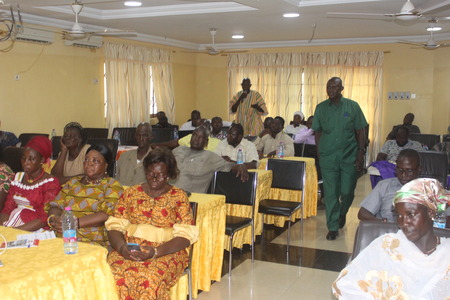The African Continental Free Trade Area (AfCFTA) is a trade arrangement that creates opportunity for free movement of goods and services within the continent. Farmers and aggregators are dominant trade agents in Ghana and other African countries and their participation in the AfCFTA framework is crucial. This is because, some of them are currently mobilizing and supplying various grains to agro-based industries in Ghana including Guinness Ghana Limited and the poultry industry, and there are plans to expand across the continent. However, concerns of poor quality grains, especially on aflatoxin contamination has affected the supply of grains to the local industries and they are fears that local producers might not be able to compete within the AfCFTA, which is anchored on high quality products. The PFAG, in recognizing this challenge, and to address them to enable farmers and aggregators compete under the trade arrangements within the AfCFTA, organized a one-day capacity building training on Post-Harvest Management, Quality and Standards, to enable members compete under the AfCFTA.
The training, which was organized in two locations; Tamale in the Northern Region and Bolgatanga, in the Upper East Region, brought together farmers and aggregators, including women, Regional and District Directors of Agriculture, CSOs, the private sector and academia, from the Northern, North East, Upper, East and Upper West Regions in Ghana. In attendance were aggregators from neighbouring country, Burkina Faso, to also share their experiences.
In his opening remarks, Dr. Charles Nyaaba, the Executive Director of PFAG, emphasized the need for farmers’ active participation in the trade arrangements under the AfCFTA. He was however, worried, that farmers do not currently produce to meet the standards for locally based industries, and that could affect them from exploring the continental market. He was particularly concerned about the high levels of aflatoxin contamination in grains produced in Ghana, especially maize and sorghum, and indicated that this were mostly due to bad farming practices as well bad post-harvest management by farmers. He also cited the lack of post-harvest infrastructure as a major concern. He indicated that with support from the Open Society Foundations, the PFAG was organizing the capacity building exercise to train farmers on good Post-harvest management strategies, handling and producing high quality grains to meet the standards for both domestic and international markets.
The farmers were taken through Aflatoxin poisoning, its regulatory limits, impact on trade and prevalence in crops and crop products in Ghana. In addition, they gained knowledge on aflatoxin management, handling of harvested products and production of quality products to meet standards. The training highlighted crops which were susceptible to aflatoxin contamination and these include maize, sorghum, groundnut, chili, millet, melon seed, ginger, sesame, cassava, among others. Ingestion of moderate to high level aflatoxin have dangerous effects on human lives with symptoms, such as acute liver damage, abdominal swelling and even death. While the acceptable aflatoxin levels in Ghana, stands at 15 ppb in maize and 10 ppb in groundnut, the European Union, standard for aflatoxin are 4 bpp for both maize and groundnut. High levels of aflatoxins, therefore limits trading opportunities for Ghanaian producers as there is lack of competitiveness in high premium and quality conscious markets, loss of foreign revenue among others.
To manage aflatoxins, farmers were taken through pre-harvest strategies, practicing of GAPS, Post-Management Breeding and selection of aflatoxin tolerant crop varieties, soil amendments and post-harvest management; timely harvest, rapid and adequate drying, cleaning and sorting, proper storage, insect pest control among others. They were also trained on the right storage facilities to store their produce, the right type of packaging material and the right conditions to move the produce to the markets.


leave a comment
You must be logged in to post a comment.